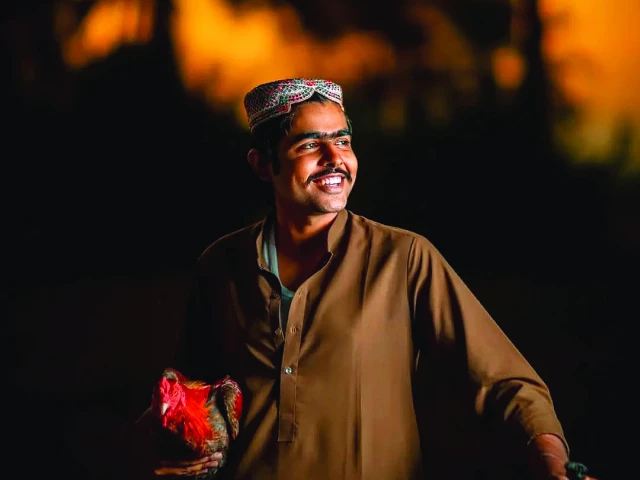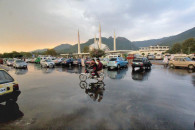From folktales to frontlines
Amjad Mirani is telling the story of Sindh one song at a time

Arts and music have always had a close relationship with resistance and revolution. One can see it in popular anthems which wake people up to resist authoritarian governments, societal injustices or merely understand their rights.
For Sindhi lyricist and vocalist Amjad Mirani, music serves the same purpose. “Music is such an art form that if we don’t use it for resistance and revolution, it’s useless,” he says.
Abri to Karachi
Born in a small village Abri, nearly 20 kilometres from Larkana, Amjad moved to Larkana in 2017 and then to Karachi in 2023.
While the 21-year-old started making music in 2021, he spent his childhood listening to Sindhi folk tales and traditional music. These stories became deeply embedded in his core. “I was surrounded by the stories of Sassui, Marvi and everyone, all the folk tales, in my village. Sindhi poetry inspired me a lot. And as I grew up, I started reading more and then eventually pursued it.”
Even though Amjad had been releasing songs for a few years with Kaashi Haider serving as his first music producer (they continue to work together till this day), he realised he should take music seriously once he moved to Karachi. And his collaborations with Sindhi rapper and music producer Babar Mangi were the perfect way of doing so.
Together, the duo has released many songs together - from Enda Enda, Lapata, and Musafir to Busin ja Dhika, Hayati and Sada Marhon.
“We work well together,” says Amjad. “He has his own ideas and melodies. I have my own. So, when we sit together, interesting combinations come out.” The two have several more tracks they intend to release in the future.
Amjad shares that his goal is to spread Sindhi music, arts and folklore globally and even collaborate with artists of other cultures, especially in South Asia. But right now, he is happy that Sindhi arts and music are slowly getting a bit of recognition in the Pakistani mainstream.
He himself has performed in Lahooti Melo and Nescafe Basement, and his music has won hearts among the Indian audience online as well. “The interest is there and people appreciate it. If people keep demanding it, it will spread even further and people will know what our music is.”
Reality and resistance
For Amjad, music is a “powerful tool for political activism.” Through music, he believes he can talk about people’s issues and resistance, create awareness, and express himself.
“As a Sindhi musician, it’s our duty to use our music to talk about what we want as a people, as well as what the river needs and how the river feels. We have to talk about the pain of the Indus River. It is important to me that I use my voice for these purposes.”
Be it through sombre or mellow melodies or in a fun, quirky satirical way, Amjad’s music and poetry definitely presents the ground realities of Sindh. “Satire works well because people enjoy the humorous touch and find it relatable.”
Most often, when artists born with a silver spoon talk about such ideas, it seems disingenuous since it becomes obvious they have no connection to the issues. The audience understands, whether we admit or not, that it’s being done for clout. But with artists such as Amjad, one can tell they have lived through the experiences they talk about in their art. His music becomes a diary of the times he’s lived in.
But while Amjad is a proponent of celebrating Sindhi culture and values, he also sees a need for balance. Inevitably, a diary of an era cannot be full of blind optimism and collective delusion of grandeur but rather chapters of present realities combined with hope and positivity.
“In our songs, we sing about how we are a peaceful people, Sindh is the land of peace and there is only love, no hate among us; be it Hindu, Muslim or anyone, we all live together here,” he says. “But when we look at Sindh closely, we see cases of forced conversions and religious extremism. We should also show that in our arts. Why do we only need to celebrate ourselves and say we are peaceful and there’s religious harmony in Sindh?”
Amjad cites an example of his work. On one hand, he wrote a song called Sada Marhon where he spoke about how Sindh is peaceful and Sindhis celebrate both Eid and Holi together. On the other hand, he wrote Pachaar, where he spoke about the ground realities of Sindh - forced conversions, censorship, wadera system, and the violence conducted due to the caste system.
“In Pachaar, I spoke about how Sindh is being strangled with these issues. So I feel we need to celebrate the values but also not ignore the reality of our society.”
While Amjad can write and sing, he primarily considers himself a writer and enjoys losing himself in the world of poetry. He says he enjoys when he can express himself sincerely. Of course, Shah Abdul Latif Bhitai remains a big influence on him. He sings praises of the Sindhi icon who “spoke about women’s freedom and rights before the word ‘feminism’ even existed.”
In fact, Amjad’s latest offering is called Soormi, and is inspired by the lives of three of the seven queens of Sindh: Sassui, Suhni and Marvi. Amjad says the song is for the women who resist, walk against the world for their rights and love their land.”
When asked what music is to him, Amjad says, “To me, music is life. It is a way of expressing myself, all my emotions, and the stories of my land, my people, my language and my river.”
And based on the extensive body of work he has built over the last few years, anyone can testify that what he says rings true.
Have something to add to the story? Share it in the comments below.

















COMMENTS (1)
Comments are moderated and generally will be posted if they are on-topic and not abusive.
For more information, please see our Comments FAQ